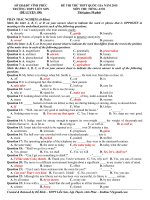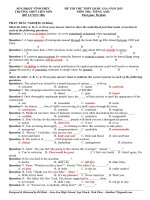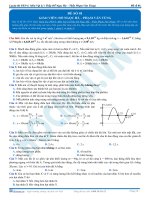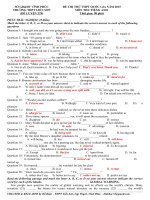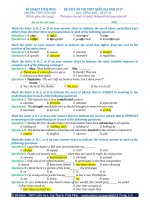DE LUYEN THI THPT QG 2016 135
Bạn đang xem bản rút gọn của tài liệu. Xem và tải ngay bản đầy đủ của tài liệu tại đây (131.6 KB, 5 trang )
<span class='text_page_counter'>(1)</span>SỞ GD&ĐT VĨNH PHÚC TRƯỜNG THPT LIỄN SƠN (ĐỀ LUYỆN 135). ĐỀ THI THỬ THPT QUỐC GIA NĂM 2015 MÔN THI: TIẾNG ANH Thời gian: 90 phút. PHẦN TRẮC NGHIỆM: (8 điểm) Read the following passage and mark the letter A, B, C ,or D on your answer sheet to indicate the c orrect answer for each of the questions. Aging is the process of growing old. It occurs eventually in every living thing provided, of course, that an illness or accident does not kill it prematurely. The most familiar outward signs of aging may be seen in old people, such as the graying of the hair and the wrinkling of the skin. Signs of aging in a pet dog or cat include loss of playfulness and energy, a decline in hearing and eyesight, or even a slight graying of the coat. Plants age too, but the signs are much harder to detect. Most body plants grow bigger and stronger, and function more efficiently during childhood. They reach their peak at the time of maturity, or early adulthood. After that they begin to decline. Bones, for example, gradually become lighter and more brittle. In the aged, the joints between the bones also become rigid and more flexible. This can make moving very painful. All the major organs of the body show signs aging. The brain, for example, works less efficiently, and even gets smaller in size. Thinking processes of all sorts are slowed down. Old people often have trouble in remembering recent events. One of the most serious changes of old age occurs in the arteries, the blood vessels that lead from the heart. They become thickened and constricted, allowing less blood to flow to the rest of body. This condition accounts, directly or indirectly, for many of the diseases of the aged. It may, for example, result in heart attack. Aging is not a uniform process. Different parts of the body wear out at different rates. There are great differences among people in their rate of aging. Even the cells of the body differ in the way they age. The majority of cells are capable of reproducing themselves many times during the course of a lifetime. Nerve cells and muscle fibers can never be replaced once they wear out. Gerontologists - scientists who study the process of aging - believe the wearing out of the body is controlled by a built - in biological time - clock. They are trying to discover how this clock works so that they can slow down the process. This could give man a longer life and a great number of productive years. Question 01. What is the main idea in the first paragraph? A. Signs of aging are easier to detect in animals than in plants. B. The outward signs of aging may be seen in old people. C. Aging occurs in every living thing after it has reached maturity.D. Not all signs of aging are visible. Question 02. Which piece of information is given in the passage? A. Gerontologists can give man a longer life. B. Gerontologists are studying how they can slow down the process of aging. C. Gerontologists have discovered that aging is controlled by a built- in biological time- clock. D. Gerontologists can prevent diseases connected with aging. Question 03. The human body begins to lose vigor and the ability to function efficiently ________ . A. soon after reaching adulthood C. before reaching adulthood B. during childhood D. in old age Question 04. In old age, the bones ___________ A. become more flexible B. become heavier C. cause much pain D. break easily Question 05. According to the passage, what condition is responsible for many of the diseases of the old? A. Their trouble in remembering recent events B. The blood vessels that have become thickened and constricted C. The rigid and inflexible joints between the bones D. The worn - out nerve cells and muscle- fibers Question 06. Many of the diseases of old people are the results of __________. A. lack of blood C. poor blood circulation B. the thickening of the blood vessels D. low blood pressure Question 07.The statement Aging is not a uniform process in line 19 means that __________ A. old people do not have the same outward signs of aging B. nerve cells and muscle fibers do not age simultaneously C. not all people age at the same age D. the process of aging is slow Question 08. The word arteries in line 15 refers to __________ . A. vessels that are thickened and constricted B. the paths along which blood flows to all parts of the body C. the tubes carrying blood back to the heartD. such heart diseases as suffered by old people Question 09. When the brain begins to age, _________..
<span class='text_page_counter'>(2)</span> A. eyesight will begin too B. memorization declines C. it becomes lighter D. the thinking processes stop Question 10. Which of the statements about aging is false? B. All body cells once worn out can never be replaced A. People vary in their rates of aging. B. All body cells once worn out can never be replaced. C. The cells of the body age in different ways. D. The various parts of the body do not wear out at the same rate. Mark the letter A, B, C, or D on your answer sheet to indicate the correct answer to each of the following questions: Question 11 The manager was very pleased with her last business trip, which had been a _____success. A. full B. complete C. whole D. high Question 12. The man you saw yesterday ……..….Mr. Brown, because he went to London on business last week. A. can’t have been B. mustn’t be C. can’t be D. mustn’t have been Question 13. “Why don’t you go to the zoo?” – “____________ .” A. That’s a good idea. B. Because we don’t have enough money. C. I couldn’t agree more. D. Yes, I’d love to. Question 14. She went ____ a bad cold just before Christmas. A. through B. over C. in for D. down with Question 15. In every country , there are _____ between different regions, especially between the North and the South, which result in unfriendliness, even hatred. A. quarrels B. conflicts C. differences D. disputes Question 16.The house that we used to live in is in a very ____ state. A. negligent B. neglected C. negligible D. neglectful Question 17. _____ the bad weather, he could get to the airport in time. A. Despite B. Though C. However D. Although Question 18. One of the great ____ to the students when they go on a mountain walk is that they learn a lot about wild flowers. A. supports B. returns C. benefits D. profits Question 19. Imagination _____ facts. A. outlays B. outruns C. outplays D. outlives Question 20. “ Were there many people waiting in line at the stadium?” – “ Yes, I saw ____________.” A. quite many B. quite much C. quite a few D. quite some Question 21. He is decorating the house with a view _____ it. A. to selling B. to be sold C. for selling D. to sell Question 22. I tried to talk her _____ joining our trip, but she refused. A. on B. in C. out of D. into Question 23. The boss ____ him because his mother had just passed away. A. made up B. made use of C. made fun of D. made allowance for Question 24. “Must we do it now?” – “No, you ____________ .” A. won’t B. needn’t C. can’t D. mustn’t Question 25.The fact is , doctor, I just cannot _____ this dreadful cough. A. get down to B. get rid of C. get out of D. get round to Question 26. The Home – Loan Company ______the right to cancel this agreement. A. serves B. conserves C. reserves D. deserves Question 27. After Joe’s mother died, he was _____ up by his grandmother. A. drawn B. taken C. grown D. brought Question 28. It _____ me as strange that my front door was open when I got home. A. occurred B. seemed C. struck D. appeared Question 29.The music aroused an _____ feeling of homesickness in him. A. intentional B. intense C. intended D. intensive Question 30. _____ regards sport and leisure activities, our two countries appear to have little in common. A. With B. What C. As D. How Question 31. Jane is plain, but her sister is very____. A. complex B. attractive C. sympathetic D. sophisticated Question 32. On the street : “ Have you found a good place to eat yet? “Yes, there’s a wonderful restaurant right down the street from the school.” “____________ ?”.
<span class='text_page_counter'>(3)</span> “ Yes. And the food is good too.” A. Is it really like that B. Do you like good food C. Are the prices reasonable D. Do they often go there Question 33. Although we argued with him for a long time, he stood his ground. A. changed his decision B. refused to change his decision C. felt sorry for us D. wanted to continue Question 34. Of all the factors _____ agricultural products, weather is the one that influences farmers the most. A. affecting B. to effect C. to affect D. effecting Question 35. I like the idea of becoming your partner and which is more, this business really _____me. A. adjusts B. conforms C. suits D. likes Read the following passage and mark the letter A, B, C ,or D on your answer sheet to indicate the correct answer for each of the questions This rapid transcontinental settlement and these new urban industrial circumstances of the last half of the 19th century were accompanied by the development of a national literature of great abundance and variety. New themes, new forms, new subjects, new regions, new authors, new audiences all emerged in the literature of this half century. As a result, at the onset of World War I, the spirit and substance of American literature had evolved remarkably, just as its center of production had shifted from Boston to New York in the late 1880s and the sources of its energy to Chicago and the Midwest. No longer was it produced, at least in its popular forms, in the main by solemn, typically moralistic men from New England and the Old South; no longer were polite, well-dressed, grammatically correct, middle-class young people the only central characters in its narratives; no longer were these narratives to be set in exotic places and remote times; no longer, indeed, were fiction, poetry, drama, and formal history the chief acceptable forms of literary expression; no longer, finally, was literature read primarily by young, middle class women. In sum, American literature in these years fulfilled in considerable measure the condition Walt Whitman called for in 1867 in describing Leaves of Grass: it treats, he said of his own major work, each state and region as peers "and expands from them, and includes the world ... connecting an American citizen with the citizens of all nations." At the same time, these years saw the emergence of what has been designated "the literature of argument," powerful works in sociology, philosophy, psychology, many of them impelled by the spirit of exposure and reform. Just as America learned to play a role in this half century as an autonomous international political, economic, and military power, so did its literature establish itself as a producer of major works. Question 36. The word evolved is closest in meaning to ___________ . A. became famous B. turned back C. changed D. diminished Question 37. The word it refers to ____________ . A. American literature B. the energy C. the population D. the manufacturing Question 38. The author uses the word indeed for what purpose? A. For variety in a lengthy paragraph B. To emphasize the contrast he is making C. To wind down his argument D. To show a favorable attitude to these forms of literature Question 39. The word exotic in line 12 is closest in meaning to ___________. A. well-known B. unusual C. urban D. old-fashioned Question 40. The phrase these years in line 16 refers to _____________ . A. the present B. the 1900s C. the early 1800s D. 1850-1900 Question 41. All of the following can be inferred from the passage about the new literature EXCEPT ________ . A. It was not highly regarded internationally B. It broke with many literary traditions of the past C. It introduced new American themes, characters, and settings D. It spoke to the issue of reform and change Question 42. It can be inferred from lines 1-3 that the previous passage probably discussed _____. A. the limitations of American literature to this time B. the importance of tradition to writers C. new developments in industrialization and population shifts D. the fashions and values of 19th century America Question 43. It can be inferred from the passage that Walt Whitman ______ . A. disliked urban life C. was an international diplomat.
<span class='text_page_counter'>(4)</span> B. wrote Leaves of Grass D. was disapproving of the new literature Question 44. The main idea of this passage is ___. A. that the new American literature was less provincial than the old B. that most people were wary of the new literature C. that World War I caused a dramatic change in America D. that centers of culture shifted from East to West Question 45. This passage would probably be read in which of the following academic courses? A. International affairs B. Current events C. American literature D. European history Read the following passage and mark the letter A, B, C ,or D on your answer sheet to indicate the correct word for each of the blanks. Ask anyone over forty to make a comparison (46)____ the past and the present and nine (47)____ ten people will tell you that things have been getting (48)____ worse for as long as they can remember. Take the weather for example, which has been behaving rather strangely lately. Everyone remembers that in their childhood the summers were (49)____ hotter, and that winter always included abundant falls of snow just when the school holidays had started. Of course, the food in those days was far superior too, as nothing was imported and everything was fresh. Unemployment was negligible, the pound really was worth something, and you could buy a sizeable house even if your means were limited. And above all, people were (50)____ better in those days, far more friendly, not inclined to crime or violence, and spent their free time making model boats and tending their stamp collections (51)____ than gazing at the television screen for hours on end. As we know that this picture of the past (52)____ cannot be true, and there are plenty of statistics dealing with health and prosperity which prove that it is not true, why is it that we all have a (53)____ to idealize the past ? Is this simply nostalgia? Or is it rather that we need to believe in an image of the world which is (54)____ the opposite of what we see around us? Whichever it is, at least it leaves us with a nagging feeling that the present could be better, and perhaps (55)____ us to be a little more critical about the way we live. Question 46. A. between B. from C. with D. in Question 47. A. to B. out of C. or D. from Question 48. A. virtually B. so C. steadily D. out Question 49. A. considerably B. at least C. rarely D. not only Question 50. A. more B. somehow C. whatsoever D. as Question 51. A. usually B. different C. other D. rather Question 52. A. especially B. hardly C. simply D. specifically Question 53. A. tendency B. custom C. habit D. practice Question 54. A. utterly B. widely C. quite D. rather Question 55. A. makes B. encourages C. reassures D. supports Mark the letter A, B, C or D on your answer sheet to show the underlined part that needs correction. Question 56. For centuries, philosophers and artists alike have debated the meaning of beauty and questioned whether it real or only perceived. A B C D Question 57. The purpose of the United Nations, broad speaking, is to maintain peace and security and to encourage respect for human rights. A B C D Question 58. There will always be a job for Mike if he change his mind. A B C D Question 59. Owing to their superior skill, highly competitive athletes have been known to win contests and break records even when suffered from injuries, physical disorders, and infections. A B C D Question 60. Language is important factor in the accumulation of culture. A B C D Mark the letter A, B, C, or D on your answer sheet to indicate the word that differs from the rest in the position of the main stress in each of the following questions: Question 61 : A. contribute B. compliment C. bacteria D. procedure Question 62 : A. stagnant B. desert C. interest D. install Question 63 : A. sacrifice B. maintenance C. disaster D. overview Question 64 : A. rhinoceros B. curriculum C. kindergarten D. discriminate.
<span class='text_page_counter'>(5)</span> PHẦN TỰ LUẬN: (2 điểm) I. Rewrite each of the following sentences in such a way that the original meaning is exactly the same as the provided one. 1. Although he had a good salary, he was unhappy in his job. In spite of............................................................................................ 2. I’m sorry I missed your birthday party I wish......................... 3. They haven’t cleaned the streets this week. The streets................ 4. Apples are usually cheaper than oranges. Apple are not................... 5. I advice you to put your money in the bank. You’d........................ II. Topic: Parents are said to influence their children many different way. What do you think about this? Parents influence greatly their children for a lifetime. I think people are molded by two factors, family and the society that they are in. From birth, humans are influenced by the surrounding people for their characteristics. Parents take a big role in bringing up children, which affects their lives for a long time. In early infanthood, babies are looking to moms and dads to learn basic manners to be accepted in society. Some of these manners include not running around in restaurants or hitting other kids. As they grow up, they learn more from parents about social etiquette, which makes them more suitable to live in society. Children tend to look to their parents for role models knowingly or unknowingly. Besides, parents can also affect children's study habits. Children of doctors, lawyers, investment bankers, and other professionals see their mothers and fathers work a lot of time, reading books, and punching keyboards, even at home. They are showing their children how to study by their own behavior. However, parents can also be a bad example for their kids. It is difficult for children who have abusive parents to lead a normal childhood and is possible that they may become similar to their abusive parents when they grow up. In this sense, the parents' negative role in shaping the children's personality cannot be emphasized more. In conclusion, parents are the best teachers for their children. They leave big marks on their children's lives and are therefore more influential teachers than any others they may have in their lives. _______THE END________.
<span class='text_page_counter'>(6)</span>
